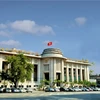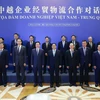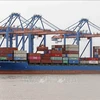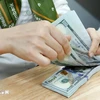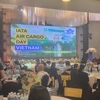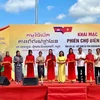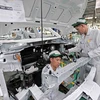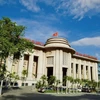Foreign investors are seeking new investments in real estate projects in Vietnam with attention on those at good locations in Hanoi and Ho Chi Minh City, according to Saigon Giai phong newspaper.
The trend began in late 2014 and has become obvious this year, as the date the new law on housing takes effect is nearing. The law will allow foreigners and overseas Vietnamese to own houses in Vietnam.
Savills Vietnam Managing Director Neil MacGregor said while Vietnam is at the trough of its real estate cycle, many other Asian markets are at the peak of their cycles. The Southeast Asian country is well-positioned for a big number of investors to take advantage of the market recovery, especially in the hotel and office segments, he added.
According to Savills Vietnam, many foreign investors are excited to buy houses in Vietnam, especially those from Singapore, a leading nation in foreign direct investment (FDI) in Ho Chi Minh City, followed by the Republic of Korea and Japan.
As a result, the high-end property segment is attracting attention. The demand for high-end apartments is continually rising. The price of renting a flat in one of the tallest buildings in Ho Chi Minh City is estimated at 36-42 USD per one square metre per month – an incredible increase from several years ago.
According to the Ministry of Construction’s Agency for Management of Housing and Real Estate Market, Ho Chi Minh City had about 1,600 successful real estate transactions in May, up nearly 6 percent from the previous month, and is expected to reach 1,700 in June. Hanoi saw 1,650 successful transactions in May and hopes to have 1,700 in June as well.
The rising demand for home ownership in Vietnam from overseas Vietnamese and foreign investors is expected to create major momentum for the local real estate market.
The Housing Law 2015 states that foreigners with current Vietnam visas are allowed to buy property in the country, as are foreign investment funds and banks, Vietnamese branches and representative offices of overseas companies.
Such property must be in commercial housing developments and not in areas that limit or ban foreigner access.
For investment projects with separate houses for sale or lease, foreign organisations and individuals may not own more than 10 percent of the total number of units within any given administrative area.-VNA
The trend began in late 2014 and has become obvious this year, as the date the new law on housing takes effect is nearing. The law will allow foreigners and overseas Vietnamese to own houses in Vietnam.
Savills Vietnam Managing Director Neil MacGregor said while Vietnam is at the trough of its real estate cycle, many other Asian markets are at the peak of their cycles. The Southeast Asian country is well-positioned for a big number of investors to take advantage of the market recovery, especially in the hotel and office segments, he added.
According to Savills Vietnam, many foreign investors are excited to buy houses in Vietnam, especially those from Singapore, a leading nation in foreign direct investment (FDI) in Ho Chi Minh City, followed by the Republic of Korea and Japan.
As a result, the high-end property segment is attracting attention. The demand for high-end apartments is continually rising. The price of renting a flat in one of the tallest buildings in Ho Chi Minh City is estimated at 36-42 USD per one square metre per month – an incredible increase from several years ago.
According to the Ministry of Construction’s Agency for Management of Housing and Real Estate Market, Ho Chi Minh City had about 1,600 successful real estate transactions in May, up nearly 6 percent from the previous month, and is expected to reach 1,700 in June. Hanoi saw 1,650 successful transactions in May and hopes to have 1,700 in June as well.
The rising demand for home ownership in Vietnam from overseas Vietnamese and foreign investors is expected to create major momentum for the local real estate market.
The Housing Law 2015 states that foreigners with current Vietnam visas are allowed to buy property in the country, as are foreign investment funds and banks, Vietnamese branches and representative offices of overseas companies.
Such property must be in commercial housing developments and not in areas that limit or ban foreigner access.
For investment projects with separate houses for sale or lease, foreign organisations and individuals may not own more than 10 percent of the total number of units within any given administrative area.-VNA


